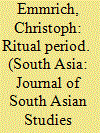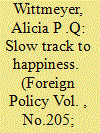|
|
|
Sort Order |
|
|
|
Items / Page
|
|
|
|
|
|
|
| Srl | Item |
| 1 |
ID:
188423


|
|
|
|
|
| Summary/Abstract |
Based on ethnographic fieldwork from 2015 to 2019, this paper explores resilience among evangelical Christians in rural northern Uganda after years of violent conflict. The paper argues that three aspects of evangelical life train and build resilience for congregation members: (1) individual and collective prayer; (2) social inclusion and resource sharing; (3) narrative practices of reframing the past and present. When these are continuously practiced within the evangelical group, these features form a kind of resilience which acts to manage the effects of violence. Thus, resilience is conceptualized as an adaptive process within an ecology of social and narrative practice.
|
|
|
|
|
|
|
|
|
|
|
|
|
|
|
|
| 2 |
ID:
132281


|
|
|
|
|
| Publication |
2014.
|
| Summary/Abstract |
Continuing further on the path laid out by Michael Allen's pioneering work on rituals that centre on Newar Buddhist girl children in Nepal, this study analyses liturgies pertaining to a religious practice called 'b?rh? pik?yagu' that ends a period of seclusion undergone by Newar girls before menarche. The article looks at three ritual manuals currently used by Buddhist priests in Lalitpur, Kathmandu and Bhaktapur, respectively. In its aim to supply a textual background to Allen's ethnography of this ritual, the study tries to place these manuals at the conjunction of other ritual textual genres, such as prescriptions for domestic rituals for women that include cosmological, demonological and pregnancy-related aspects, and attempts to explore their composition, their intention and their place within the larger ritual literature of Buddhism among the Newars.
|
|
|
|
|
|
|
|
|
|
|
|
|
|
|
|
| 3 |
ID:
129229


|
|
|
|
|
| Publication |
2014.
|
| Summary/Abstract |
Anyone who has been in a Muslim country during Ramadan knows the transformation that comes about with the first sighting of the crescent moon. During the holy month, the devout fast from sunrise to sunset. Bustling thoroughfares go quiet; office hours are shorter to accommodate fasting employees; and business grinds to a halt, to the frustration of expats and foreign partners. Now, a new paper from two Harvard University researchers confirms what until now has only been a nagging suspicion: Religion isn't good for the economy. Economists Filipe Campante and David Yanagizawa-Drott examined data from every Ramadan since 1950, using the amount of time spent fasting as a measure for intensity of religious practice. Focusing on countries that were more than 75 percent Muslim, they found that when people spent more time fasting -- when Ramadan fell during the long days of summer, for instance -- it took a bigger toll on economic growth. Increasing the average daily fast in a country from 12 to 13 hours, for example, decreased GDP growth by about 0.7 percentage points, the authors found. More-intense religious ractice, in other words, left worshippers poorer. And being poorer makes you less happy, right?
|
|
|
|
|
|
|
|
|
|
|
|
|
|
|
|
| 4 |
ID:
131478


|
|
|
|
|
| Publication |
2014.
|
| Summary/Abstract |
In the first decade or so after the breaking up of the Soviet Union and the independence of the Central Asian states there was an explosion in literature dealing with Islam in the region. Very little of it, however, was based on extensive fieldwork. Furthermore, most of these studies tended to be guided by security and geopolitical concerns and mainly focused on the question of whether there was a risk that militant or radical Islam might gain a foothold in the region. People's everyday religious practice and experiences and their ideas about Islam, on the other hand, were very much neglected.
|
|
|
|
|
|
|
|
|
|
|
|
|
|
|
|
|
|
|
|
|